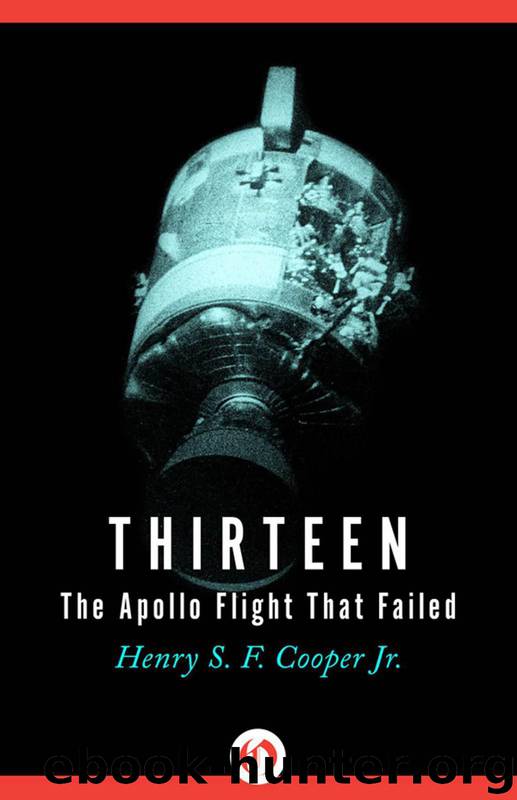Thirteen: The Apollo Flight That Failed by Henry S. F. Cooper

Author:Henry S. F. Cooper [Cooper, Henry S. F.]
Language: eng
Format: azw3
Tags: vl-nfspace
ISBN: 9781480462199
Publisher: Open Road Media
Published: 2013-12-31T05:00:00+00:00
BACK
GENERALLY SPEAKING, space-flights are less satisfying to the people who follow them on television than the adventures of earth-bound explorers have usually been to those who have read about them in books. For one thing, technology seems to impinge too heavily on the televised space travels; what was once called a spaceship, to give a small example, has become a module. However, technology notwithstanding, the men who ply between the earth and the heavens are not doing anything much different from what was done by the explorers who merely used the heavens to steer by. The Apollo 13 astronauts were now in every bit as understandable and distressing a predicament as any seamen aboard a leaky vessel in danger of foundering. This was readily grasped by the estimated third of the world’s population who were following Apollo 13—probably more than had followed any other spaceflight. There was a sort of worldwide shudder of horror, for if these men died they could do so in a way no men ever had before: they could be the first never to return to the dust of this planet. Newspapers in many countries published cartoons representing the world with a pair of hands; in some cases the hands were reaching out for the astronauts, and in others they were simply clasped in prayer.
Despite similarities with earthbound crises, getting the astronauts back would obviously require a vaster cerebral effort than any conventional rescue operation. After the PC+2 burn, Kranz removed his White Team from the regular cycle of shifts—or, as he put it, he “took it off the line,” the way astronauts might set aside a battery that was needed for some special purpose—so that its members could devote themselves entirely to this effort. While the three other teams were handling the relatively routine coast back toward the earth, the White Team would be writing a new reëntry checklist. A checklist for a spaceflight can be as thick as a telephone book and take three months to prepare; now the White Team had to write one in less than three days, and that span of time would shrink by half a day before they actually got down to it, for Kranz wanted his team to get some sleep before they set to work. According to Swigert, the astronauts could never have got back to earth without the White Team’s checklist. On that trip back, a number of things would have to be done that had never been done before. In the last hours of the flight, the astronauts would have to leave the lunar module and find some way to power up the command module, the only part of the spacecraft that had a heat shield. A power-up of a dead command module had never even been simulated on the ground, let alone attempted in space, and there were many questions. Would the command module’s delicate electronic systems work after more than three days of cold? For that matter, would its three reëntry batteries, which
Download
This site does not store any files on its server. We only index and link to content provided by other sites. Please contact the content providers to delete copyright contents if any and email us, we'll remove relevant links or contents immediately.
Learning SQL by Alan Beaulieu(6282)
Weapons of Math Destruction by Cathy O'Neil(6268)
Digital Minimalism by Cal Newport;(5751)
iGen by Jean M. Twenge(5409)
Sapiens by Yuval Noah Harari(5366)
The Age of Surveillance Capitalism by Shoshana Zuboff(4282)
Elon Musk by Ashlee Vance(4122)
Thing Explainer by Randall Munroe(3932)
Apollo 8 by Jeffrey Kluger(3707)
Future Crimes by Marc Goodman(3595)
The Science Book (Big Ideas Simply Explained) by DK(3278)
The Innovators: How a Group of Hackers, Geniuses, and Geeks Created the Digital Revolution by Walter Isaacson(3172)
Who Can You Trust? by Rachel Botsman(3131)
I Live in the Future & Here's How It Works by Nick Bilton(2995)
Infinite Energy Technologies by Finley Eversole(2977)
Steve Jobs by Walter Isaacson(2892)
Dawn of the New Everything by Jaron Lanier(2770)
Chernobyl by Serhii Plokhy(2536)
Ben Franklin's Almanac by Candace Fleming(2527)
